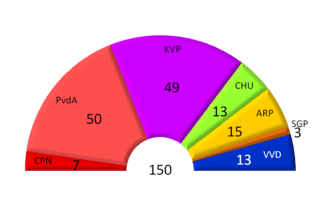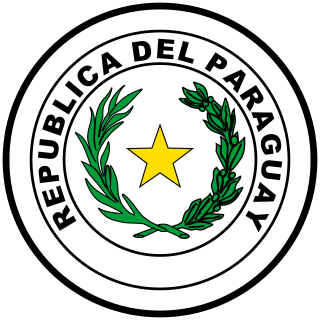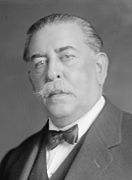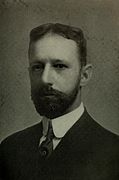The Liberal Party of Andorra is a liberal and conservative-liberal political party in Andorra. It is a member of the Liberal International and the Alliance of Liberals and Democrats for Europe.

General elections were held in Denmark on 20 November 2001. For the first time since the 1924 elections, the Social Democrats did not win the most seats. Anders Fogh Rasmussen of the centre-right Venstre became Prime Minister in coalition with the Conservative People's Party, as the head of the first Rasmussen government, with the support from Danish People's Party.
The Autonomist Liberal Party, renamed usually semplified in Liberal Party in 1898, was one of major parties from 1910 until the Cuban Revolution the late 1950s, when it was exiled.

General elections were held in the Netherlands on 13 June 1956. For the first time, the Labour Party (PvdA) emerged as the largest party, winning 50 of the 150 seats in the House of Representatives.

General elections were held in the Netherlands on 28 April 1971. The Labour Party (PvdA) emerged as the largest party, winning 39 of the 150 seats in the House of Representatives. The elections were the first without compulsory voting, causing a sharp fall in voter turnout, down to 79.1% from 94.9% in the 1967 elections. Barend Biesheuvel of the Anti-Revolutionary Party (ARP) became Prime Minister, leading the first Biesheuvel cabinet.

General elections were held in the Netherlands on 3 May 1994. The Labour Party emerged as the largest party, winning 37 of the 150 seats in the House of Representatives. The election resulted in significant losses for both the Labour Party and the Christian Democratic Appeal. The two liberal parties, People's Party for Freedom and Democracy and Democrats 66 made large gains, whilst two pro-elderly parties and the Socialist Party all passed the electoral threshold to win seats.
The Democratic Party is a center-right party in Bulgaria led by Alexander Pramatarski. The party is a member of the European People's Party (EPP).
The National Encounter Party is a political party in Paraguay.

Parliamentary elections were held in Greece on 7 November 1926. The Liberal Union emerged as the largest faction in Parliament with 108 of the 286 seats. The composition of the new parliament meant that the parties and factions had to work together to form a viable parliamentary government. On Kafandaris' initiative negotiations began among the main parties, leading to the swearing-in on the 4 December of a government under the premiership of Alexandros Zaimis who was not a member of parliament. The coalition consisted of the Liberal Union, the Democratic Union, the People's Party and the Freethinkers' Party. This government came to be known as the "Ecumenical government".

Parliamentary elections were held in Greece on 31 March 1946. The result was a victory for the United Alignment of Nationalists, an alliance that included the People's Party, the National Liberal Party, the Reform Party, which won 206 of the 354 seats in Parliament. As a result Konstantinos Tsaldaris became Prime Minister leading a right-wing coalition. Nonetheless, he soon decided to resign in favor of Themistoklis Sophoulis, who led a government of national unity during the entire second phase of the civil war (1946–1949). One of the priorities of the new government was the proclamation of a plebiscite for the restoration of the Greek monarchy.
Elections for the sixth Knesset were held in Israel on 2 November 1965. Voter turnout was 85.9%.
Elections for the seventh Knesset were held in Israel on 28 October 1969. Voter turnout was 81.7%.

General elections were held in Nicaragua on 20 October 1996. Arnoldo Alemán of the Liberal Alliance was elected President, with the Liberal Alliance also winning 42 of the 93 seats in the National Assembly.

General elections were held in Cuba on 1 November 1954. Fulgencio Batista won the presidential election running under the National Progressive Coalition banner, whilst the main opposition candidate, Ramón Grau San Martín, withdrew his candidacy before election day. Progressive Action Party emerged as the largest party in the House of Representatives, winning 60 of the 130 seats. Voter turnout was 52.4%.

General elections were held in Cuba on 1 November 1920. Alfredo Zayas y Alfonso won the presidential election, whilst the National League emerged as the largest faction in the House of Representatives, winning 31 of the 59 seats.

General elections were held in Paraguay on 9 May 1993. In the country's first honest election, as well as the first with no military candidates since 1928, Juan Carlos Wasmosy of the Colorado Party won the presidential election. The Colorado Party remained the largest party in the Chamber of Deputies and the Senate, albeit with only a plurality. The opposition Authentic Radical Liberal Party and National Encounter Party held a majority of the seats in both chambers, later supplemented by the Colorado Reconciliation Movement which broke away from the Colorado Party. Voter turnout was 69.0% in the presidential election, 67.6% in the Chamber elections and 69.4% in the Senate elections.

Parliamentary elections were held in Bulgaria on 4 September 1911. The result was a victory for the People's Party-Progressive Liberal Party alliance, which won 190 of the 213 seats. Voter turnout was 47.2%.

General elections were held in Italy on 22 October 1865, with a second round of voting on 29 October. It was the second one in the history of Italy.

The People's Liberal Party was a political party in Bulgaria.

The National Liberal Party was a political party in Bulgaria.
















